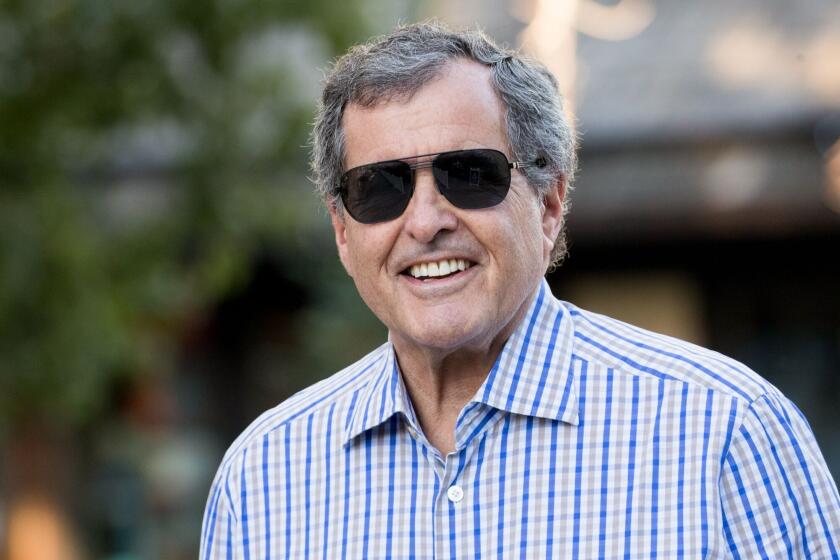MAI’s Uncertain Future : Chairman’s Plan to Sell Out His Holdings Raises Many Questions
- Share via
When two New York investors decided to put their 43% stake in MAI Basic Four up for sale, the Tustin computer company’s riches-to-rags-to-riches-again story suddenly became dotted with question marks.
Why are Bennett S. LeBow, MAI’s chairman, and William Weksel, a LeBow business associate and former MAI president, unloading $116 million worth of stock?
Will they find a purchaser? If so, will the buyer be content to acquire slightly less than half of MAI, or will the entire company change hands? And what will the future hold for MAI under new ownership?
MAI--one of the industry’s top performers in recent years--has already attracted dozens of inquiries from potential buyers in the United States, Europe and Japan. The list is believed to include West Germany’s Nixdorf Computer, MAI’s toughest competitor in Europe; one or more Japanese electronics firms, and some U.S. semiconductor and telecommunications firms.
Although some Wall Street analysts have speculated that MAI’s management might try to take the company private in a leveraged buyout, William B. Patton, MAI’s president and chief executive, said he has ruled out that option. A leveraged buyout--in which the purchase is financed almost entirely through borrowed funds--would boost the company’s already hefty debt burden to unacceptable levels, Patton said.
Analysts said LeBow probably will try to sell his stock to a single buyer. A likely result of the sale, Wall Street analysts say, is that the buyer will seek to acquire all of MAI’s shares, returning the public company to private ownership.
(LeBow owns 37% of MAI, and Weksel, an officer in several businesses controlled by LeBow, owns 5.4%. LeBow’s family owns an additional 17% of MAI’s stock. Although the family-owned shares are not part of the 43% stake up for sale, analysts believe that it is likely they will be offered for sale as well.)
The pending stock sale makes for “a very exciting time” at the Tustin company, said Patton, who joined a then-struggling MAI in 1985 and is credited with engineering its successful turnaround.
If the firm is acquired by a large technology company, which seems likely, MAI officials said the company would benefit from the financial and technical resources that a deep-pocketed partner could offer. That is especially important to MAI, which faces a constant struggle to update its computer hardware to remain competitive with much larger rivals such as IBM and Digital Equipment.
The company has hired the New York investment firm of Drexel Burnham Lambert to advise it on the stock sale. Drexel Burnham is the largest institutional investor in MAI, owning about 1 million shares.
Analysts estimate that MAI should be worth about $23 to $25 a share to a potential buyer. MAI stock has been trading at about $18 per share since the LeBow sale was announced.
MAI management is reportedly anxious to find a buyer.
“Management is concerned about overall morale and gossip around the water cooler, and they don’t want this to stretch on for very long,” said Robert M. Johnson, an analyst with the Houston investment firm of Rotan Mosle.
Weksel, who is president of LeBow Industries in New York, said the purpose of the stock sale is to “free up time” for other investments. Analysts say LeBow, who often invests in troubled or out-of-favor companies, probably needs to free up money for those deals as well.
LeBow did not return phone calls seeking comment for this article.
Recently, LeBow entered the battle for control of Allegheny International, the maker of Sunbeam and Oster appliances, by joining a group of dissident shareholders who are trying to take over the company. LeBow also owns a controlling interests in the Liggett Group, a North Carolina cigarette manufacturer, and Western Union. LeBow, Western Union’s chairman, is given credit for the financial rescue of the New Jersey communications firm.
“Our expertise is really in turning companies around,” Weksel said. “MAI Basic Four is a company that has been turned around and is doing extremely well. From our perspective, our job was completed some time ago.”
Fred D. Anderson, MAI’s chief financial officer, said LeBow is primarily interested in deals that promise substantial returns.
“He is a 10-1 guy,” Anderson said. “We’re not a 10-1 play anymore.”
LeBow is undoubtedly pleased with his investment in the Tustin computer maker. He put up only $5 million of his own money when he bought Management Assistance, MAI Basic Four’s predecessor company, in a leveraged buyout in January, 1985. If LeBow is successful in selling his entire stake, he is expected to receive more than $100 million. Not a bad return in 3 1/2 years.
Founded in 1971 as Basic Four Corp., a subsidiary of Management Assistance Inc., the company became a darling of Wall Street when its sales of intermediate-size computers or “minicomputers” designed for small and medium-size businesses grew an average of 40% a year from 1975 through 1979.
In the early 1980s, Basic Four’s fortunes faltered because of increasing competition from other minicomputer makers and the proliferation of personal computers that offered cheaper and more powerful technology than Basic Four’s machines. The Basic Four division suffered four consecutive years of losses, capped by a $17.2-million loss in 1984. By the end of that year, the company was on the sales block.
At about the same time, Management Assistance was acquired in a hostile takeover orchestrated by Asher B. Edelman, a well-known corporate raider. Edelman split up Management Assistance, selling its Sorbus computer maintenance business to Bell Atlantic and the Basic Four computer systems business to LeBow for about $105 million.
LeBow promptly sold Basic Four’s Canadian maintenance subsidiary to Bell Atlantic for $23 million cash. He also cut the payroll by 450 jobs, including firing the company’s president and eliminating 14 of 21 vice presidents. Several months later, he brought in Patton, an engineer and 17-year veteran Honeywell executive, to serve as president.
One of Patton’s first moves was to redirect the marketing strategy of the company, newly named MAI Basic Four. Instead of trying to compete in every market with general-purpose computers, the company began selling its systems to eight specific business groups, including manufacturing, hotels, construction, apparel and transportation.
A key benefit of this strategy has been that MAI sidesteps direct competition with industry giants such as IBM and Digital Equipment Corp. Instead, MAI primarily competes against so-called value-added resellers. These resellers typically are much smaller companies that purchase computers made by IBM, Digital or other manufacturers and add their own custom software designed for specific business purposes.
But MAI can’t avoid competing with the industry’s heavy hitters altogether. The company could be hurt, analysts said, if IBM or Digital began to move into some of MAI’s key markets. Analysts point out, however, that a key strength of MAI is its large catalogue of software programs designed for specific customers--an advantage not easily duplicated by another company.
Revenues, Profits Climb
So far, MAI’s strategy has worked. MAI was profitable in Patton’s first year on the job, and revenues and profits have been climbing ever since. The company sold stock to the public in 1986. Employment, which hit a low of 2,750 after the layoffs, has climbed back up to an all-time high of 4,600.
“They’re a very focused company now,” said Suzanne Purnell, a technology analyst with Dataquest, a San Jose market research firm. “Patton understands marketing, and he understands the industry. He’s a good leader and runs a tight ship.”
MAI’s revenues have grown from $168.5 million in fiscal 1985 to $321 million in the fiscal year ended last Sept. 30. More significantly, net income has increased more than fourfold the past two years, from $5.5 million in 1985 to $23.8 million last year.
Wall Street estimates of MAI’s revenues this year range from $435 million to $445 million, with net income estimates of $28 million to $30 million.
A large share of MAI’s revenue and profit growth this year will come from its recent repurchase of the computer service businesses that it sold to Bell Atlantic in 1984. MAI paid $146 million to buy back the two Bell Atlantic subsidiaries, MAI Canada Ltd. and the Basic Four repair business of Sorbus Inc.
Analysts believe a new owner is unlikely to disband a management team with as good a record as MAI’s. Still, anything is possible.
“I almost hate to see it (the change in ownership), because management has done such a good job,” said Johnson, the Houston analyst. “They’ve made an awful lot of the right moves, and someone would be silly to come in and try to shuffle things around.”
For his part, MAI’s Patton says he is not worried about his job. “I intend to be here for as long as I can walk or talk.”
MAI BASIC FOUR AT A GLANCE Tustin-based MAI Basic Four manufactures and services business computers and information-processing systems for small and medium-size companies.
Year ends Sept. 30
(in millions) 1987 1986 1985 1984 1983 Revenue $321.0 $281.0 $168.5 $289.9 $252.1 Profit (loss) $23.8 $9.1 $5.5 ($17.2) ($11.3)
Assets $234.7 million (at Dec. 31, 1987)
Number of employees 4,600
Shares outstanding 14.7 million
52-week price range $19.25-$8.75
Friday’s closing price (NYSE) $18.875
Chairman Bennett S. LeBow
President, chief executive William B. Patton
More to Read
Inside the business of entertainment
The Wide Shot brings you news, analysis and insights on everything from streaming wars to production — and what it all means for the future.
You may occasionally receive promotional content from the Los Angeles Times.










